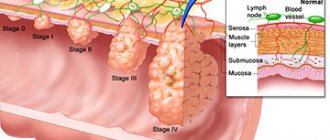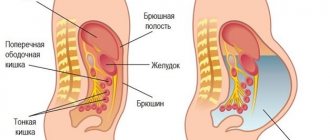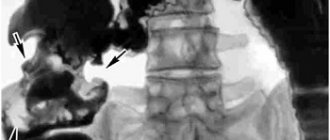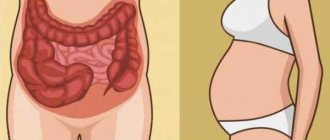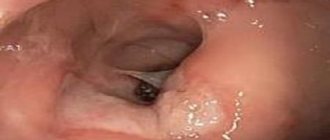The intestine is the longest section of the digestive system, which is located in the abdominal cavity. But its functions are not limited to just digesting food and absorbing nutrients. It is a participant in immune processes, some hormones are synthesized here, and toxins are eliminated. Any disruption to the functioning of this organ immediately affects a person’s well-being.
Intestinal structure
The human intestine consists of two sections: the small intestine and the large intestine. They differ not only in appearance, but also in the functions they perform.
The small intestine is quite long - about 4 meters. It starts from the stomach, has a diameter of 4-6 cm in the upper sections, gradually narrowing to 2-3 cm.
The small intestine has three sections:
- duodenum - starts from the stomach, is shaped like the letter “C”, its length in ancient measures is 12 fingers (fingers), hence the name
- jejunum - follows the duodenum
- ileum - the lower section of the small intestine, has no borders with the jejunum, therefore the separation of these two sections is conditional, determined by the length of the small intestine as 2:3
The main processes of food digestion occur in the small intestine. It is attached to the posterior wall of the abdominal cavity by a fold - the mesentery, which is penetrated by blood vessels and nerve endings. The small intestine is located in the abdominal cavity in such a way that it has multiple bends (loops) along its entire length.
There is a partition between the small and large intestines that prevents food from flowing back.
The large intestine is smaller in length (about 1.5 meters), but wider in diameter (up to 10 cm).
It also consists of several departments:
- cecum (an appendix extends from it)
- ascending colon
- transverse colon
- descending colon
- sigmoid colon
- rectum
In the large intestine, water is absorbed and feces are formed, which is expelled through the end of the rectum - the anus.
In addition to the general functions of the digestive organ, each section of the intestine performs its own specific work.
You can visualize the structure of the intestines by watching the video provided.
What is IBS?
The medical term “irritable bowel syndrome” is encoded under the abbreviation IBS. And although it is not widely known among the people, this disease occurs in 20% of the world's population. The most mysterious thing about IBS is that science is not yet able to determine the only root cause that causes its appearance. It is a complex disorder caused by a number of factors and produces several distinct symptoms. However, often irritable bowel syndrome cannot be identified immediately, since it is disguised as many diseases of the gastrointestinal tract.
The main symptoms of IBS look like this:
Painful and uncomfortable sensations
The patient feels discomfort in the epigastric region, which does not have a clear location, but appears “vaguely”, covering different areas of the abdomen. The pain appears and disappears, having a spastic character. Often a person experiences colic and cramps, which can last from several hours to 1 - 2 days and disappear immediately after the passage of gas or bowel movement. The intensity of the pain is an individual indicator, but sometimes the spasms are so strong that a person experiences difficulty breathing, swallowing, speaking, etc.
Change in bowel habits
IBS is characterized by instability in the mode and type of stool. Some patients complain of constant diarrhea, others experience difficulties with natural bowel cleansing, in other words, suffer from constipation. A combination of symptoms is often found. The stool may be watery or unformed, containing inclusions of undigested food and mucous inclusions.
Frequent urge to defecate
Often, after a bowel movement, a patient with IBS continues to feel the urge to go to the toilet again without reason. Also, a similar symptom occurs in the morning. This is explained by impaired innervation of nerve endings in the intestines against the background of constant inflammation and irritation of the walls of the mucous membrane.
Other manifestations of IBS:
- Constant nausea, feeling of tongue being coated;
- Dry mouth;
- Belching;
- Decreased appetite and, as a result, body weight;
- Permanent fatigue, irritability;
- Bloating;
- Regular, frequent urge to urinate;
- Heartburn;
- Feeling of a full stomach even after a small snack;
- Involuntary frequent passage of gases.
Causes of bloating
Today, doctors cannot accurately answer the question of what causes intestinal irritation to develop into a chronic condition. According to one version, IBS can be caused by increased activity of the long muscular duct and nerves that connect the digestive tract from the mouth to the anus. As you know, the basis of the digestive tract is made up of parts of the large and small intestines. The food bolus passes through their structure with the help of systematic muscle contractions performed by the intestinal walls. When the frequency of contractions acquires a slow or, conversely, too intense rhythm, pain and other symptoms of dysfunction of the digestive system may appear in the gastrointestinal tract.
It is not known for certain what is the reason for the increase/decrease in activity in certain parts of the digestive tract. The following hypotheses exist :
Abnormal activity of nerve or muscle fibers
Appears against the background of a corresponding increase in the activity of signals sent by the brain. In turn, the cause of this phenomenon may be stress (chronic or acute), depressive states, emotional distress and nervous/mental diseases. The excitability of the nervous system directly affects the condition of the intestines, and every second adult has experienced a similar condition at least once.
Infectious or bacterial contamination
Sluggish chronic or acute intoxication of the gastrointestinal tract gives pronounced symptoms of irritable bowel syndrome. Especially often it appears against the background of gastroenteritis or rotavirus.
Antibiotic therapy
Taking drugs from the antibacterial class in the absence of maintenance therapy to regenerate the intestinal microflora can worsen its condition and cause IBS. The so-called medicinal dysbiosis appears.
Individual intolerance
Intolerance to individual products or their components, including genetic disorders (celiac disease, hypolactasia, etc.).
Dilated intestinal loops in adults
Dilated intestinal loops in an adult due to various reasons can become a factor in various unpleasant sensations and diseases. They can even affect a person's appearance by changing their posture.
Normally, the abdominal wall, consisting of muscle tissue, protects the abdominal organs from damage. It is impossible to determine their outlines by eye.
But due to insufficient cleansing of the intestines and accumulation of gases, the enlarged loops begin to put pressure on the abdominal wall from the inside, causing it to bulge outward.
To balance the position of the body in space, the back muscles take on additional load, changing the position of the spine. As a result, this can lead to back pain and changes in the intervertebral discs.
Enlarged loops take up more space in the abdominal cavity, compressing nearby organs and making it difficult for them to function properly. If the condition of the intestines does not improve, the situation becomes increasingly worse.
Without paying attention to the functioning of this digestive organ for quite a long time, a person then discovers that he has many different diseases that tend to appear suddenly at the most inopportune time.
Ultrasound diagnostics of intestinal loops
Timely detection of swollen, enlarged loops helps to suspect certain diseases at an early stage of development and begin treatment. Pathology can be diagnosed using ultrasound, plain radiography, CT, MRI. Typically, swollen intestines are detected on ultrasound during examination for other gastrointestinal diseases. It is important to properly prepare for the examination so as not to get false positive results.
On ultrasound, distended intestinal loops appear as rounded hypoechoic structures surrounded by a hyperechoic rim (wall) and a level of liquid contents. With pneumatosis, the contours of the intestine are uneven, the wall is stratified in some places, and gases accumulate in it. Air bubbles prevent the passage of ultrasound, and therefore do not make it possible to study the structures and organs located deep in the abdominal cavity.
Having discovered this pathology, the diagnostician must try to identify the cause. To do this, if possible, examine the remaining organs of the abdominal cavity, carefully study the loops in order to exclude the presence of an obstacle (oncology). If this fails, a repeat ultrasound may be required in a few days, with careful preparation in advance.
Intestinal bloating is accompanied by additional unpleasant symptoms. This can be a temporary disorder of the digestive system, or signal the onset of serious diseases - from simple gastritis to pancreatitis and cancer. Some pathologies without timely treatment can even lead to death.
Causes and symptoms
The structure of the intestine is such that its position in the abdominal cavity is characterized by many bends and loops. If self-cleaning is not complete, fecal particles can remain in these loops, narrowing the intestinal lumen.
Subsequently, less and less space remains for the movement of digested food, but its movement is still carried out due to stretching of the intestinal walls. As a result, the intestinal loop remains dilated.
The same process can occur due to increased gas formation in the intestines, only gases, rather than food debris, press on the intestinal walls.
The reasons causing these processes may be the following:
- unhealthy diet, irrational food intake (lack of diet, overeating with a long period of no food intake)
- insufficient fluid intake
- unhealthy lifestyle (sedentary, bad habits, lack of routine)
- increased gas formation can be caused by stomach diseases (ulcers, gastritis), taking medications, or a lack of enzymes involved in the digestion process
- intestinal diseases (tumors, scars, adhesions, worms)
- dilation of intestinal loops can occur against the background of dysbiosis
The dilated loops themselves do not show any symptoms.
But their presence can be indirectly suspected by the following signs:
- frequent constipation
- increased gas formation, bloating
- protrusion of the anterior wall of the abdomen, a change in its normal physiological shape
- disruption of the functioning of other organs located in the abdominal cavity
Confirming the presence of dilated intestinal loops is possible only through special studies.
Symptoms of the disease
The cause of frequent bloating inside the intestines is accumulated gases. As a result, a feeling of heaviness and fullness appears in the stomach. Pain appears. It can have a varied character - be pulling, cramping, cutting or stabbing. The abdomen is greatly enlarged, which can be seen even visually. Then they appear:
- nausea;
- belching;
- rumbling;
- unpleasant odor from the mouth;
- loss of appetite.
The intestines begin to put pressure on the diaphragm. As a result, pain in the heart appears, rapid heartbeat, shortness of breath, and heart rhythm disturbances. If the symptoms of bloating do not go away, then a headache begins and weakness occurs. A person's sleep is disturbed and his mood worsens.
From the gastrointestinal tract - stool disorders (constipation or diarrhea). When gases begin to pass away, this happens with a loud sound, which causes inconvenience and discomfort to the person. However, if this is prevented, the stomach swells even more, and the pain becomes much stronger.
Diagnostics
Dilatation of intestinal loops is most often detected during the diagnosis of another disease of this organ, being a concomitant disorder.
The patient can suspect such a deviation from the norm independently, based on the symptoms and appearance of the abdomen. In healthy people, below the navel, about the size of a palm, the stomach is convex.
Around this bulge there is a small U-shaped depression formed by the muscles of the abdominal wall. If such a depression is absent, this may be evidence of painful dilatation of the small intestinal loops.
The traditional diagnostic test is an x-ray. But on ordinary x-rays, the intestinal loops are not visible very well; only gas accumulations and shadows of feces are visible.
Therefore, in this case, the contrast method (injection of a contrast agent) is often used. This study is performed in different positions of the human body, which allows us to obtain the most complete picture of the disease.
Information about dilated intestinal loops can also be obtained using endoscopy, ultrasound and computed tomography.
Based on the symptoms experienced by the patient, the doctor can choose the most effective way to diagnose the disease.
Prognosis and possible complications
With intestinal pneumatosis, the prognosis depends on the underlying disease, the timeliness of its detection and the start of therapy. The formation of “air” cysts in the thickness of the organ wall increases the risk of perforation and can lead to intestinal obstruction and internal bleeding.
In continuation of the topic, be sure to read:
- Causes of bloating and increased gas formation, treatment methods
- Details about bowel cancer: stages, symptoms, treatment and prognosis
- Rectal cancer: symptoms, stages, treatment and prognosis for life
- Rectal fissure: causes, symptoms and treatment of pathology
- Details about the coprogram: preparation, conduct and interpretation of the analysis
- More about hemorrhoids: causes, symptoms and treatment methods
- Irritable bowel syndrome: symptoms and treatments
- Diseases of the small intestine: symptoms and signs of the disease, treatment
- Preparation and performance of intestinal ultrasound
- Intestinal ultrasound or colonoscopy: comparison of techniques and their information content
Dilated intestinal loops: treatment
In the treatment of dilated intestinal loops, comprehensive measures should be used. Simply dealing with symptoms will not bring the desired result.
Medicines for increased gas formation, laxatives, and enzyme medications only temporarily relieve discomfort, leaving the problem unresolved.
Much in correcting the situation depends on the person himself. First of all, he needs to establish a healthy lifestyle, increase physical activity, and include time for defecation in his daily routine. A balanced diet is of great importance.
The attending physician will advise you on the set of necessary treatment measures.
It may include the following activities:
- treatment of the underlying disease that caused the dilation of intestinal loops
- diet correction
- restoration of violations of the movement of feces
- purgation
- treatment of dysbacteriosis
- fight against constipation
If the doctor deems it necessary, he may prescribe absorption agents (activated carbon, Polysorb, Polyphepan, etc.), which help eliminate gases and toxins, as well as enzyme replacement therapy.
It should be understood that excessive expansion of intestinal loops can lead to loss of some functions, which sometimes has irreversible consequences.
Therefore, a positive effect should be expected from timely treatment if the patient complies with all the doctor’s instructions. But even in this case it will take quite a long time.
After the main course of treatment, lifestyle and nutritional requirements remain unchanged for the patient.
Treatment
Elimination of such a disorder is often conservative in nature and consists of:
- prescription of medications;
- diet;
- use of alternative medicine recipes.
In turn, drug treatment for bloating involves performing several tasks:
- neutralization of the manifestation of concomitant symptoms;
- elimination of the cause of the appearance of the main symptom. Patients may be prescribed antibiotics, probiotics, and laxative tablets;
- combating increased gas formation. Enzymatic substances, enterosorbents and carminative medications help very well against intestinal bloating.
When intestinal bloating, a very important place is occupied by following a gentle diet, which involves not only a complete rejection of foods that cause increased gas formation, but also compliance with several rules, namely:
- frequent and fractional food consumption. You can eat up to six times a day, but in small portions;
- Chewing food thoroughly - this will help relieve stress on the intestines and prevent overeating;
- eating meals every day at the same time - this will prepare the body for digesting food;
- The last meal should be consumed two hours before bedtime;
- cooking food in the most gentle ways, food must be boiled or stewed, steamed or baked;
- food temperature control. Food should not be excessively hot or extremely cold.
In addition, there is another good way to treat bloating - these are traditional medicine recipes that will help you get rid of such an unpleasant condition in a short time. The most effective means are:
- chamomile and ginger root;
- cumin and coriander seeds;
- dill and flax seeds;
- lemon balm and fennel.
It is worth noting that alternative medicine therapy should not be the only way to neutralize such a disorder. Before using traditional recipes, it is best to consult with your doctor.
Surgical intervention is used quite rarely, often when conservative treatment methods are ineffective or for individual indications, for example, if the cause of intestinal bloating is a malignant or benign neoplasm.
Prevention of intestinal diseases
To prevent intestinal diseases, any person should be careful about their health.
It is necessary to follow simple rules throughout your life, because it is very easy to disrupt the functioning of this organ, while restoring its normal functioning is a long and complex process.
Prevention of intestinal diseases is based on the following principles:
- Drink at least 2 liters of water daily. Water helps soften stool and make it easier to move throughout the intestines. Consequently, it prevents congestion and constipation.
- Proper nutrition, which includes following a meal schedule, balancing nutrients, eating high-quality foods, and maintaining hygiene standards when preparing and eating food.
- A calm environment while eating, chewing food thoroughly.
- Refusal of strict diets for the purpose of losing weight.
- A healthy lifestyle (giving up bad habits, sufficient physical activity and exercise).
- Avoiding situations that cause stress and negative emotions.
- Prevention of constipation and increased gas formation by correcting the diet.
- You should strive for regular bowel movements, taking into account your own individual characteristics (not all people have bowel movements every day; for some, the norm will be once every two to three days).
- Timely treatment of gastrointestinal diseases.
By following these simple provisions, you can maintain the health of your digestive organs for many years. In return, the person will receive a good mood, no problems with appearance and strong immunity, which will protect against many other diseases.
Symptoms of bloating
Gases, accumulating in large quantities in the intestinal loops, cause a feeling of fullness, heaviness, and pain of various types: aching, stabbing, cutting, cramping. The abdomen increases in volume and looks “bloated”. Bloating may be accompanied by rumbling in the stomach, belching, nausea, loss of appetite, and bad breath.
Due to intestinal pressure on the diaphragm, heart pain, rapid heartbeat, heart rhythm disturbances, and shortness of breath may occur. With constant bloating, headaches, sleep disturbances, mood disorders, and general weakness are likely to occur. From the gastrointestinal tract, diarrhea and constipation are possible. Gases can often be released with loud sounds, causing inconvenience, but they can also linger in the intestines, causing them to swell more and more. Undesirable consequences of bloating:
- persistent disruption of the digestive system;
- accumulation of rotting and fermentation products in the lower intestines;
- negative changes in the work of neighboring organs;
- insufficient absorption of substances beneficial to the body;
- intoxication of the body with products of rotting and fermentation;
- deterioration of general condition;
- irritability, depression.
Colon cleansing methods
Parts of feces that do not leave the intestines on time harden over time, turning into stones. Fecal stones gradually decompose, poisoning the body with toxins.
In addition, they are a favorable environment for the development of pathogenic bacteria and can cause inflammatory processes. From time to time it is necessary to empty the intestines of these wastes.
The large intestine mainly needs to be cleansed. Food passes through the small intestine quite quickly. Once in the thick one, it becomes dehydrated (water is absorbed), hardens, and its particles can stick (“stick”) to the inner wall.
The most effective methods of colon cleansing are the following:
- Diet. Its purpose is to remove mucous plaque, which interferes with the absorption of nutrients and impedes the functioning of the intestines. This method is used at home by adjusting the diet towards increasing the consumption of vegetables and fruits, preferably raw. These products contain a large amount of fiber, which is not absorbed by the body, but causes the intestinal walls to contract more intensely. Thanks to this, unnecessary accumulations and mucus are separated from the walls and removed outside. A popular recipe is the “Pastel” salad, for which raw cabbage, carrots, and beets are taken, finely chopped and seasoned with vegetable oil. You can add other ingredients to your taste (radish, celery, dill).
- Dietary supplements. The diet can be combined with the use of dietary supplements that stimulate intestinal function and remove toxins. These include activated carbon, flaxseed oil or dry flax seeds, and plantain extract.
- Bentonite clay. This type of clay can be used as a dietary supplement to have a laxative effect and help eliminate toxins. You can purchase it in specialized stores or organic food departments. Take one tablespoon of the suspension an hour before meals.
- Enema. Used to cleanse the large intestine. For this procedure, you need about 2 liters of clean water; you can add a little salt, chamomile infusion or other additives as recommended by your doctor, depending on the condition and diseases of the intestines. The water should be warm if constipation is caused by intestinal spasms (for example, due to stress), or cold if the cause of insufficient cleansing is sluggish contractions of this organ. Frequent enemas can be harmful by washing out beneficial microflora from the intestines, so you should follow your doctor's recommendations.
- Colon hydrotherapy. The procedure is carried out in a medical facility using a special device. It consists of deep cleansing of the large intestine, through which a large amount of a special solution (up to 60 liters) passes per session.
Before you begin cleansing the intestines by any method, you must obtain the advice of a doctor. Each method has its own indications and contraindications; in the presence of gastrointestinal diseases, independent use of some methods can be harmful.
Features in children
The indications for performing an ultrasound of the large or small intestine in a child are the same as in an adult - suspicion of a disease. Preparation for the examination also includes diet and medication, but there are features depending on the age of the child.
Newborn babies do not need to follow a diet. Since they feed on milk, the intestines are almost always empty. They are examined immediately before the next feeding. Newborns often have gas, so they are always given a carminative drug - “Espumizan” or “Bobotik”.
Older children are prescribed a light diet - boiled chicken, porridge, vegetables. The examination is done on an empty stomach. The procedure is usually performed transabdominal.
Causes of bloating
Bloating (more precisely, bloating) is the accumulation of a large amount of gases in the intestinal lumen. Normally, every person has gaseous contents in the gastrointestinal tract. An increased amount of gases for any reason causes bloating, swelling of various parts of the intestines, manifested by an increase in the volume of the abdomen and a number of other symptoms. This condition can be caused by both chronic diseases and temporary problems in the body. Why gas accumulation and bloating can occur in those who suffer from diseases of the gastrointestinal tract and in healthy people:
- when consuming large quantities of fermenting foods (legumes, brown bread, baked goods, potatoes, cabbage, grapes, prunes and others);
- when consuming large amounts of carbonated drinks;
- while consuming “incompatible” foods (for example, fruit during the main meal);
- when using baking soda as a “remedy for heartburn”, which provokes increased formation of gases;
- with rapid absorption of food, during which air is swallowed;
- when eating large amounts of heavy, fatty foods that require a long time to digest;
- with a sudden sharp change in diet (for example, in case of giving up meat products, when moving to another area);
- when overeating.
The question of rational choice of medicine for bloating
All medications for bloating can be divided into several groups:
- Reducing the surface tension of gas bubbles. They act on the basis of simethicone or dimethicone. Chemically inert, they act only according to the laws of physics. Approved for use in various age categories (including infants). Such a drug helps the gases in the intestines “collapse”, break down to the smallest state and can be released naturally or absorbed through the mucosal wall.
- Plant origin. Since ancient times, the properties of dill water and fennel in reducing intestinal colic in infants have been known. It is noteworthy that the fruits of these plants, which are referred to in folk recipes, are used in the creation of pharmaceutical medicines. There are whole herbal mixtures freely available that help fight gas in the stomach.
- Enzyme preparations. Since some of the causes of discomfort in the abdominal cavity are problems with the liver and pancreas, the body can be helped by using anti-bloating tablets in the form of amylase, papain, pepsin, etc. (pepphysis, mezim, creon).
- Probiotics for correcting the dysbiotic state of the intestines (bifidobacteria and lactobacilli). Any representative of this group fights conditionally pathogenic flora that has multiplied in excess. After balancing the biocenosis, the intensity of the fermentation process in the lumen of the digestive tube decreases.
- Regulators of gastrointestinal motility, both stimulating peristaltic waves and relaxing intestinal smooth muscle cells (prokinetics and antispasmodics). A properly selected anti-bloating medicine from this group is also used for constipation associated with autonomic dysfunction.
- Enterosorbents. They remove symptoms of flatulence due to the adsorption of substances on their own surface. The passage of gases is facilitated by physical mechanisms.
Since flatulence is only a syndrome of a certain pathology or malnutrition, before using a specific remedy, it is necessary to determine the source of the problem.
The modern pharmaceutical industry offers a whole arsenal of drugs for bloating, used by doctors in various situations.
If motor dysfunction is the basis of the disorders, the patient will be helped to relieve bloating by taking prokinetics (domperidone, itopride, bromopride).
Combination medications for bloating are available. In case of increased acidity of gastric juice and accompanying flatulence, products containing a carminative component and antacids are used. Such medications include Relzer, Antareit.
Gases do not pass away even with atonic constipation. In such cases, it is important to stimulate the intestines.
Constant swelling of intestinal loops without progression of symptoms is often associated with dietary errors.
Prevention
To avoid the appearance of permanent bloating, the following rules of prevention must be observed:
- adhere to the correct diet with the complete exclusion of gas-forming products from the menu;
- lifelong cessation of bad habits;
- promptly eliminate those pathological processes that can become a source of bloating;
- take medications only as prescribed by the clinician and strictly adhere to the dosage;
- perform exercises to strengthen the abdominal muscles;
- lead an active lifestyle, but without excessive physical activity;
- eat food only in a calm environment;
- undergo a preventive examination with a gastroenterologist several times a year.
